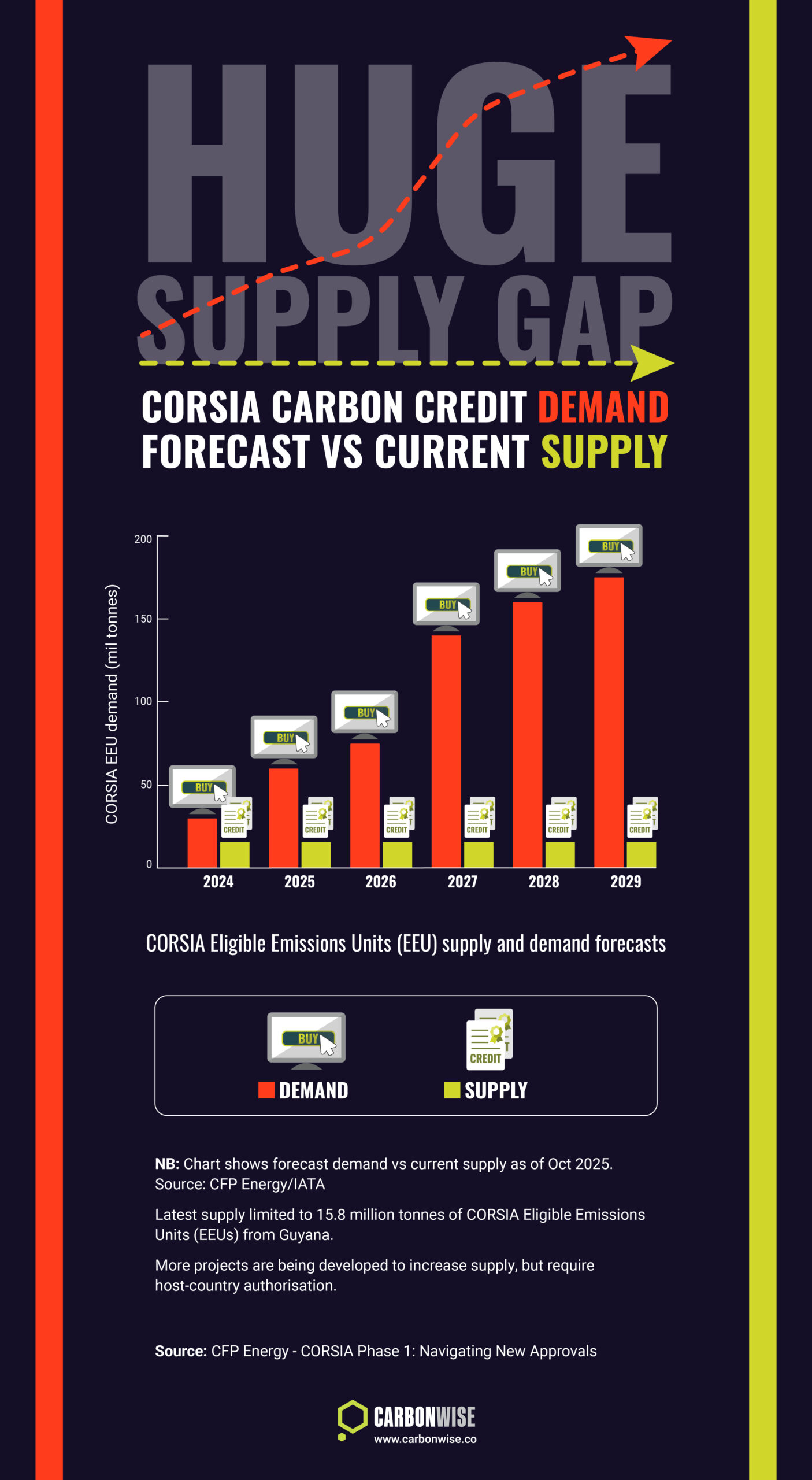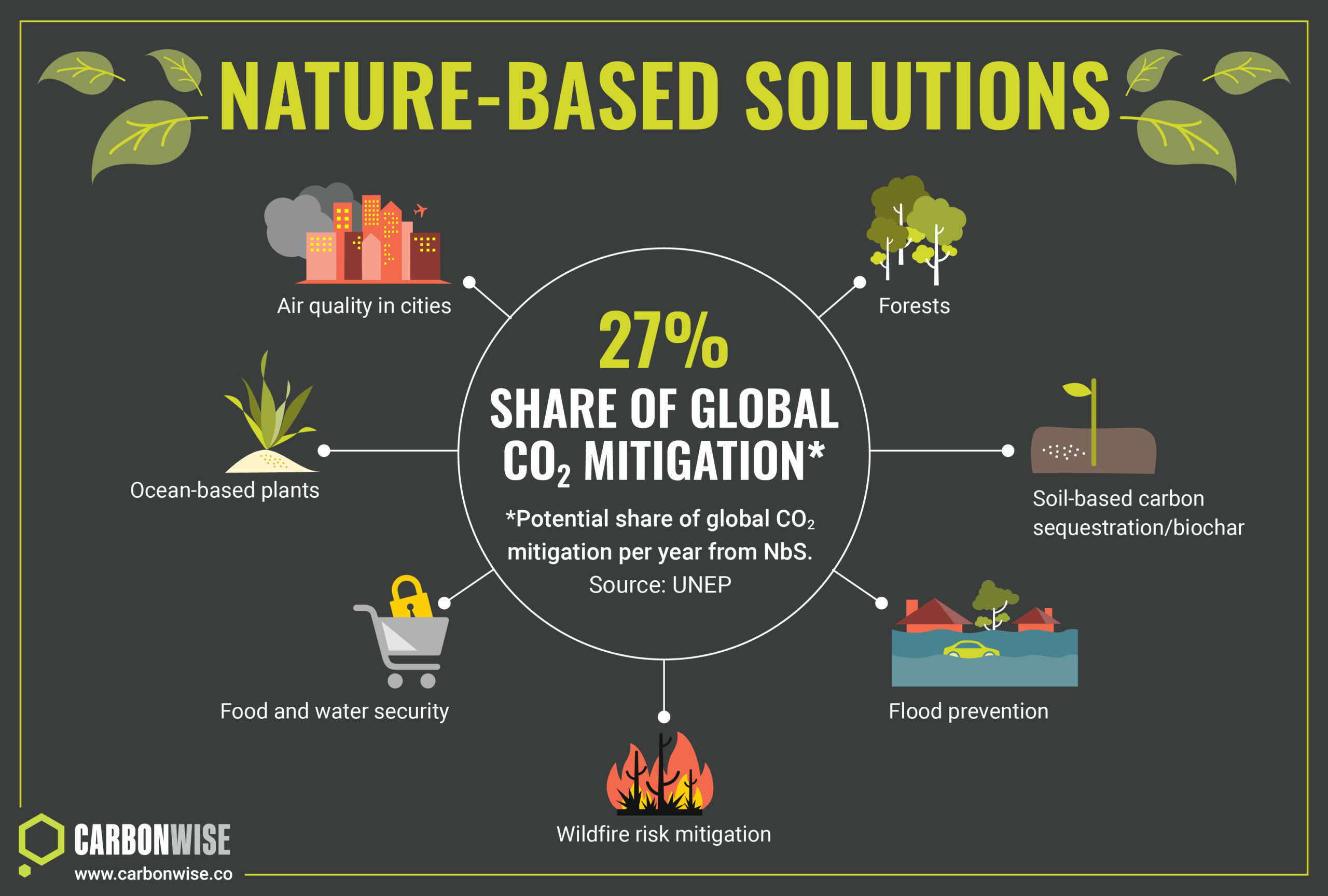Demand for eligible carbon credits is set to grow under the UN’s Carbon Offsetting and Reduction Scheme for International Aviation (CORSIA) as airlines’ CO2 emissions continue to rebound from 2020’s COVID-linked lows.
But there’s a problem.
Only 15.8 million tonnes worth of credits have been approved so far from projects in one host country, Guyana, according to global aviation industry group the International Air Transport Association (IATA). This is way short of expected demand of around 75 million tonnes in 2026.
This suggests a looming supply crunch coming for airlines, which is only likely to get worse as the sector’s emissions continue growing.
What’s the deal?
Under CORSIA, airline companies must hand over carbon credits that match any CO2 emissions growth above a baseline year of 2019. The more their emissions grow, the more credits they will need to buy, consistent with the ‘polluter pays’ principle.
Airlines have until 31st January 2028 to surrender carbon credits to cover their emissions during the 2024-2026 period.
The situation is concerning enough that IATA (which represents 350 airlines comprising over 80% of global air traffic), wrote to governments around the world urging them to expedite climate projects that qualify under CORSIA, in a bid to increase the supply of credits and alleviate the bottleneck.
“The International Air Transport Association (IATA), together with carbon market stakeholders, is calling on governments worldwide to urgently address the extremely limited supply of carbon credits available for airlines to fulfil their obligations (under CORSIA),” IATA said in a statement released during the 42nd International Civil Aviation Organisation Assembly in Montreal, Canada, which ran from 23rd September to 3rd October 2025.
In short, governments need to step up on the approval process, according to the aviation industry.
So why the bottleneck?
It all comes down to host country approval of the projects that generate credits that are deemed eligible under the program, known as CORSIA Eligible Emissions Units or ‘EEUs.’
Carbon project developers require a Letter of Authorisation (LoA) from the host country in order to operate a project that then generates appropriate carbon credits. This can be a complex process that gets caught up in government bureaucracy, leading to uncertainty and delays.
Among other things, one complication is that for a project to be able to issue carbon credits that are used outside the country, the host country government must issue a ‘Corresponding Adjustment’. This is an adjustment to the host country’s national emissions tally, to ensure that credits are not counted twice: once by the host country and again by another entity. Governments are at various stages of readiness with regards to this kind of emissions accounting framework, and some may be reluctant to see carbon credits being sold off abroad.
While more than 4,000 projects could technically supply CORSIA-eligible credits, only about 1,500 are located in countries that are ready to make authorisations under Article 6 of the Paris Agreement, according to carbon markets rating agency Sylvera.
Partly as a result of these procedural complexities, the supply of credits available has so far been limited to 15.8 million, from projects in Guyana. Many other projects are proposed, but have not yet reached the point where they can issue credits.
Airlines will need between 146 and 236 million EEUs during CORSIA’s first phase, running 2024-2026, according to IATA, far outpacing the supply issued so far.
This is the bottleneck that IATA wants to ease, thereby increasing the supply of credits for airlines.
The timely issuance of LoAs is key to creating a robust and transparent market for CORSIA EEUs; facilitating the successful implementation of CORSIA; and safeguarding the environmental integrity of international aviation’s climate commitments, IATA said in the statement.
So what?
The number of projects issuing EEUs could ramp up in the coming months and solve the supply problem. But if they don’t, the shortage is likely to get more severe, and a number of consequences could be set in motion:
1. Risk of non-compliance: If airlines cannot source enough credits, they may fail to meet their obligations under CORSIA, threatening the credibility of the program itself.
2. Rising prices: if the supply constraints are not lifted, this could prompt a scramble as airlines compete to buy enough eligible credits, driving prices higher.
3. Seeking alternatives: a combination of tight supply and higher prices for EEUs could prompt airlines to reduce their CO2 emissions in order to minimise their exposure under CORSIA, through measures such as increased use of Sustainable Aviation Fuel (SAF) or through efficiency measures and other approaches (exactly the kind of measures that carbon markets are supposed to incentivise).
4. Price volatility: Any surge in EEU prices could begin to unwind if governments fast-track their LoAs and bring projects onstream, providing supply to meet rising demand from airlines. This has the potential to bring EEU prices back down again over the long term.
What are the next steps? It’s hard to predict how this will unfold, but watch this space as pressure increases on governments to approve carbon projects and provide the supply of credits that airlines are going to need to comply with CORSIA.
To see how demand for aviation carbon credits is forecast to grow, see this graphic: insert link to Visual Learning item (chart showing CORSIA supply and demand).To learn more about CORSIA and the compliance credit market, read our article here: CORSIA & the Compliance Credit Market – Carbonwise






